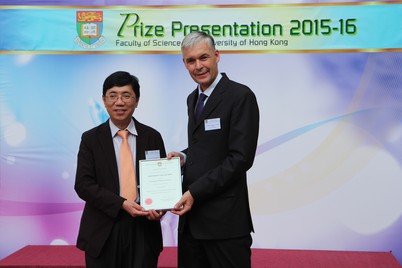HKU at Forefront in Developing New Sources of Lighting
Professor Che has several patents that have been licensed by local, national and international companies, who are working with him to develop platinum OLEDs into industrial applications.
The prospect of folding up a display screen and tucking it into a pocket or purse, or even having it sewn into a sleeve, is coming closer to reality thanks to the work of Professor Chi-Ming Che, the Dr Hui Wai Haan Chair of Chemistry, and his laboratory.
Professor Che holds patents for organic light-emitting diodes (OLEDs) that make groundbreaking use of platinum. OLED is an emerging technology for display, lighting and many other applications and it has huge potential over current technologies in terms of flexibility, efficiency and energy saving.
Professor Che first reported on the potential of platinum-based OLEDs in 2003 and since then he has been working to prove that this can be the case. He has several patents that have been licensed by local, national and international companies, who are working with him to develop platinum OLEDs into industrial applications.
"We are working interactively with industry to see what the problems are so we can address them. This is no longer basic research but real industrial research so we can see how it works in daily life. This is not an easy journey but we are making good progress," he said.
Professor Che was the first in the world to discover that phosphorescent metal complexes can make OLEDs widely usable by greatly increasing the efficiency in electroluminescence, among other benefits. He reported his findings in 1998 but he did not patent that discovery due to lack of resources (HKU now has a well-established patenting and licensing system under the Technology Transfer Office). An American firm made a similar discovery around the same time and got patents; its OLEDs using iridium are now the world standard.
But iridium-based OLEDs have a complicated construction and, because they are through one company, the cost is quite high.
Professor Che is addressing the concerns with his platinum-based OLEDs, which have a more simple construction that is not only stable and robust, but also allows for pulsing of light and a high efficiency in switching colours.
There is still further research needed on the platinum-based OLEDs – Professor Che and his team have produced red and green emissions and are now working on blue, which is the third and final colour needed for lit displays, but he is confident this will be achieved. He has received funding from the Innovation and Technology Fund and the National Basic Research (973) Program for his work. And he has even started exploring a cheaper substitute for platinum: tungsten. "Platinum is just the beginning of the enormous potential of OLED technology," he said.
Professor Chi-Ming Che of the Department of Chemistry received the Faculty Knowledge Exchange (KE) Award 2016 of the Faculty of Science for the project 'High Performance Phosphorescent Platinum(II) Emitters for OLED Application'.


